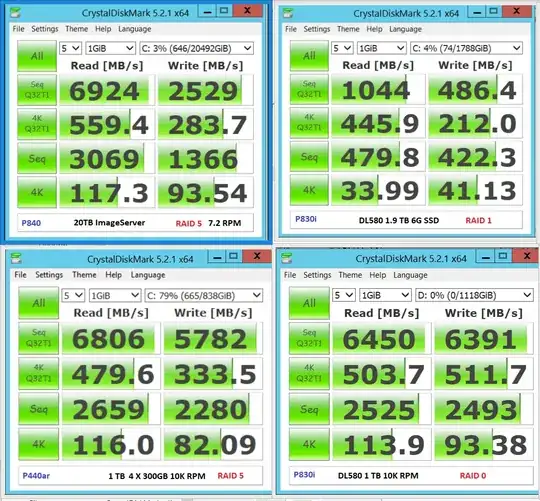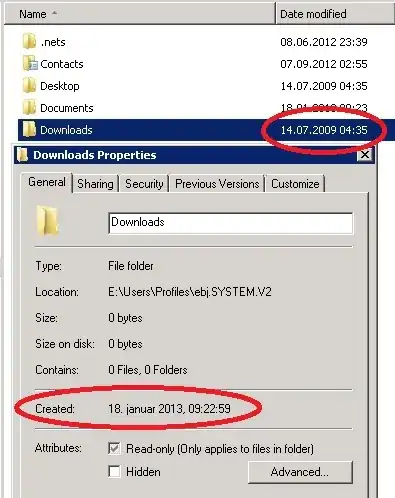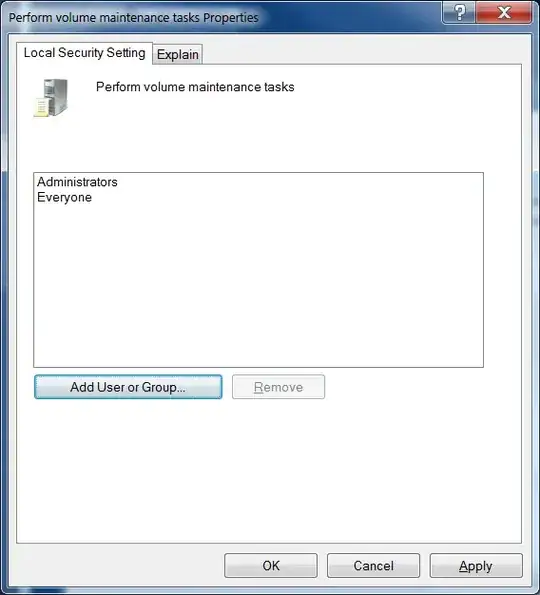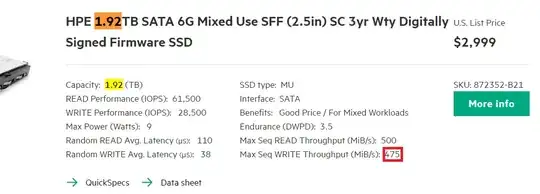In below screenshot, I benchmarked 3 machines, 4 Drives. my main production based on DL580, HPE 1.92TB SATA 6G Mixed Use SFF SSD RAID 1.
MySQL insert time of 1 million rows is ~ 30 seconds in the SSD, while its ~ 15 seconds in the ImageServer 20TB 7200 RPM RAID 5!! How the hell this is possible?
The SSD cost me ~ USD 2300 , I am really shocked, all firmwares and drivers up to date, and OS is Windows 2012 R2.
Is this known or expected?! if not, then share your insight.
Details about the 3 machines:
HP ProLiant DL380 Gen9, Smart Array P840, 20TB RAID 5 volume: 12 X 2 TB 7200 RPM (Drive Type: SAS HDD,model: HP MB2000FCWDF, Firmware Version: HPD9, Transfer Speed: PHY 1: 6 Gbps ).
HP ProLiant DL380 Gen9, Smart Array P440ar, ~1TB RAID 5 volume: 4 X 300 GB 10500 RPM (Drive Type: SAS HDD,model: HP EG0300FCVBF, Firmware Version: HPD9, Transfer Speed: PHY 1: 6 Gbps ).
HP ProLiant DL580 Gen9, Smart Array P830i, 1.9TB RAID 1 volume: 2 X HPE 1.92TB SATA 6G Mixed Use SFF SSD (Drive Type: SATA SSD, model: ATA MK1920GFDKU , Firmware Version: HPG0 , Transfer Speed: 6 Gbps ). This is the machine in Question, the machine also contain second disk: 1 TB RAID 0 10500 RPM "the fourth in the picture".
Update 1:
re-benchmark SSD after enabling write cache in the smart array didn't do anything as below screenshots highlight! do i need to reboot after enabling write cache?
Update 2:
Further Digging showed that My SSD BenchMarked Write Performance seems to meet the Specs of 28500 IOP/S as mentioned in HPE link: http://ssd.hpe.com/recommendations see below screenshot (please correct me if I understood wrong)
Max Seq WRITE Throughput (MiB/s): 475
Also all the 3 HP smart arrays official specs mentioned in performance section:
- 12Gb/s SAS (1200 MB/s theoretical bandwidth per physical lane)
- 6Gb/s SATA (600 MB/s theoretical bandwidth per physical lane)
Finally: All Smart Arrays GUI, In Controller Hardware Information Section showed:
Negotiated PCIe Data Rate: PCIe 3.0 x8 (7880 MB/s)
Putting all that together, it seems SAS HDD out performed the SSD with the help of the smart array cache and RAID 5. I couldn't find Max Seq WRITE Throughput for the SAS HDD, Does anyone know?
Maybe it can be calculated using the benchmark results:
Example: in case of the 4 X 300 GB SAS HDD:
Seq WRITE Throughput (MiB/s) Benchmarked as: 5782
Divide 5782 By 4 (number of disks) = 1445.5 MiB/s
But Since smart array Max is 1200 MB/S, I guess my calcs missing something!
That's All, Please share insight/feedback/corrections.



